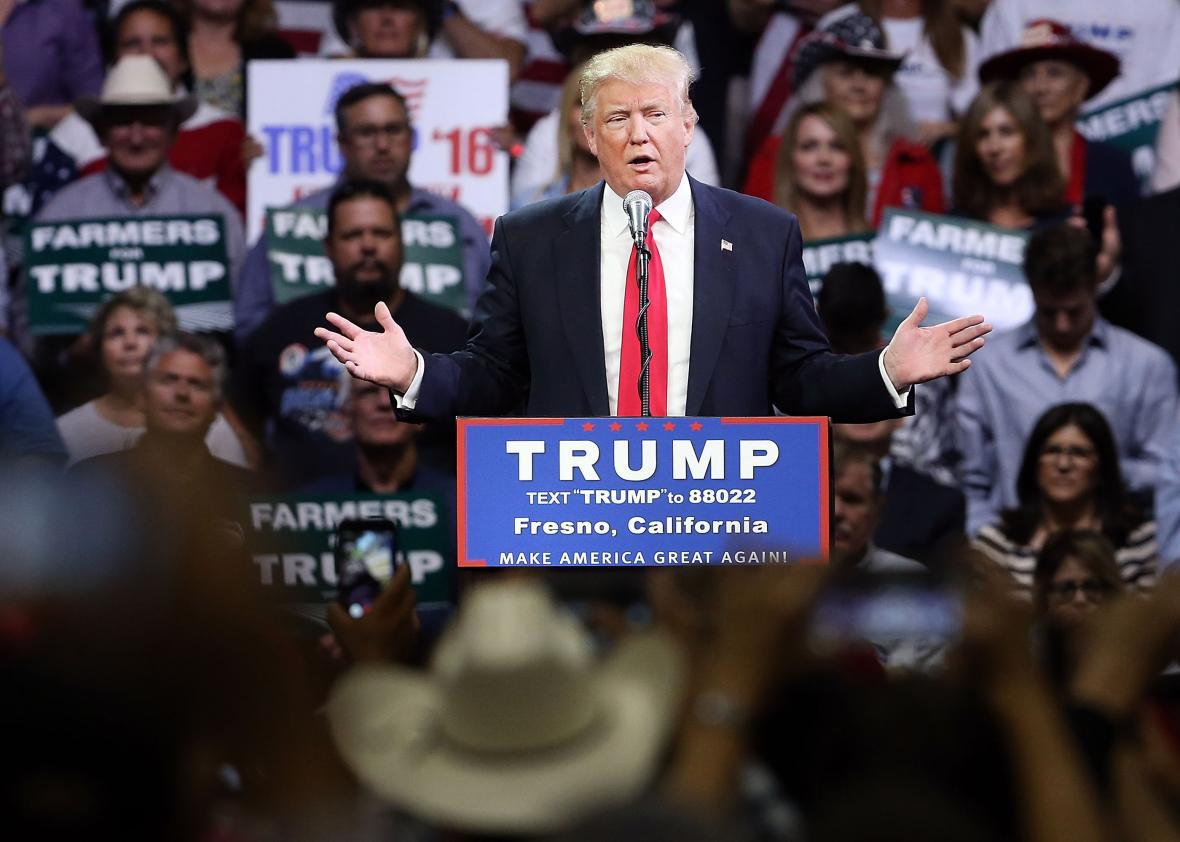A couple of weeks ago, the Democratic National Committee coined a nickname for Donald Trump: dangerous Donald. This fell somewhere short of the sublime. The alliteration was pleasing enough, but the strain showed. The DNC was trying to do to Trump what he has done throughout this campaign season: coin a devastating nickname that will stick to the competition. Trump has come up with “low-energy Jeb,” “little Marco,” “lyin’ Ted,” and “crooked Hillary.” More recently, he’s trotted out “goofy Elizabeth Warren,” “crazy Bernie Sanders,” and the Clinton alternate “heartless Hillary.”
Nearly all of the names have indeed stuck, thanks in no small part to the media, which has giddily latched on to each new one. “Drawing on psychological warfare tactics that Mr. Trump used to defeat ‘Lyin’ Ted’ Cruz, ‘Little Marco’ Rubio and ‘Low-Energy’ Jeb Bush in the Republican primaries, the Trump campaign is mapping out character attacks on the Clintons,” the New York Times recently reported. It was hardly an isolated instance; the epithets are frequently used as evidence of Trump’s gift for no-holds-barred politicking. When even staid outlets such as the Times are doing Trump’s work for him, deploying the nicknames in straight news articles, you know the candidate’s tactics are working.
But are Trump’s nicknames actually clever—or have they gained currency because the media has all too eagerly bought into the idea that he has a gift for devastating insults? “Give a man a reputation as an early riser,” Mark Twain wrote, “And he can sleep until noon.”
I would argue that we’ve given Trump way too much credit. There’s no question that some of his nicknames have managed to distill a competitor’s essence. It may not have taken much psychological insight to identify lying as Ted Cruz’s signature trait or a Madison Avenue ad man to label the lugubrious Jeb Bush “low-energy.” But the nicknames caught on because they seemed to fit—or at least to fit with the media narrative as it already existed around the respective candidates.
Other Trump nicknames, however, are neither clever nor pointed; calling the slight of stature Marco Rubio “little” is not exactly the work of a rapier wit. Here, Trump seems very much to have benefited from Twain’s observation that reputations can be self-fulfilling: The media has decided Trump is a brilliant nicknamer; thus, his nicknames are brilliant. (“Dangerous Donald” is just as apt as “lyin’ Ted,” but it has little hope of sticking; no one thinks of Debbie Wasserman Schultz as a world-class razzer.) Trump’s other advantage is that no one else on the political stage could bestow such nicknames, because coining nicknames is an inherently childish and silly thing to do—watching people who are generally not considered ridiculous insult people with nicknames makes them, the insulters, seem childish. Rubio learned this lesson the hard way when he got down in the sandbox with Trump, managing only to sully his own reputation in the process.
The absurd degree to which we’ve bought into the idea that Trump is some kind of nicknaming savant becomes clear when you consider the category of Trump monikers that fail even to live up to the “little Marco” standard. Love her or hate her, is there really anything “goofy” about Elizabeth Warren? “Crazy Bernie Sanders” is neither witty nor apt; surely there is something more biting to be mined from the political life of the self-proclaimed democratic socialist than “crazy.” (“Bolshevik Bernie” might have eluded Trump’s command of world history.) Recently, Trump trotted out “heartless Hillary” in front of the National Rifle Association because, he claimed, she wants to “heartlessly” take people’s guns. The nickname made little sense, but that didn’t stop the press from talking it up. When media outlets didn’t write news stories focused on the nickname itself—which several did—they still used it in the headline.
It’s the media that has allowed Trump’s nicknames to become a story, rather than the ridiculous gimmick that they are. “Trump has a knack for coining just the right moniker, the perfectly dismissive and catchy thing,” the Times’ Mark Leibovich wrote recently in an item (“Donald Trump Shares His Opponent-Branding Secrets”) that may have set out to mock the candidate but ended up lavishing him with praise for the “tabloid-ready directness” of his nicknames. “I feel it, it’s an instinct,” Trump bragged. “Not everyone can do this,” Leibovich observed.
That much is true. Give Trump credit for taking the media’s fawning coverage of his “branding” abilities and running with it. Reporters, whom Trump has called “dishonest”; “disgusting”; “slime”; “scum”; and, on Tuesday, “sleaze,” might consider covering his knack for name-calling with a touch more skepticism.
